- Home
- P. G. Wodehouse
Mike at Wrykyn
Mike at Wrykyn Read online
MIKE AT WRYKYN
P. G. WODEHOUSE
CHAPTER I
MIKE
IT was a morning in the middle of April, and the Jackson family were consequently breakfasting in comparative silence. The cricket season had not begun, and except during the cricket season they were in the habit of devoting their powerful minds at breakfast almost exclusively to the task of victualling against the labours of the day. In May, June, July, and August the silence was broken. The three grown-up Jacksons played regularly in first-class cricket, and there was always keen competition among their brothers and sisters for the copy of the Sportsman which was to be found on the hall table with the letters. Whoever got it usually gloated over it in silence till urged wrathfully by the multitude to let them know what had happened; when it would appear that Joe had notched his seventh century, or that Reggie had been run out when he was just getting set, or, as sometimes occurred, that that ass Frank had dropped Sheppard or May in the slips before he had scored, with the result that the spared expert had made a couple of hundred and was still going strong.
In such a case the criticisms of the family circle, particularly of the smaller Jackson sisters, were so breezy and unrestrained that Mrs. Jackson felt it necessary to apply the closure. Indeed, Marjory Jackson, aged fourteen, had on three separate occasions been fined pudding at lunch for her caustic comments on the batting of her brother Reggie in important fixtures. Cricket was a tradition in the family, and the ladies were resolved that it should not be their fault if the standard was not kept up.
On this particular morning silence reigned. A deep gasp from some small Jackson, wrestling with bread-and-milk, and an occasional remark from Mr. Jackson on the letters he was reading, alone broke it.
“Mike’s late again,” said Mrs. Jackson plaintively, at last.
“He’s getting up,” said Marjory. “I went in to see what he was doing, and he was asleep. “So,” she added with a satanic chuckle, “I squeezed a sponge over him. He swallowed an awful lot, and then he woke up, and tried to catch me, so he’s certain to be down soon.”
“Marjory!”
“Well, he was on his back with his mouth wide open, so I had to. He was snoring like anything.”
“You might have choked him.”
“I did,” said Marjory with satisfaction. “Jam’ please, Phyllis, you pig.”
Mr. Jackson looked up.
“Mike will have to be more punctual when he goes to Wrykyn,” he said.
“Oh, Father, is Mike going to Wrykyn?” asked Marjory. “When?”
“Next term,” said Mr. Jackson. “I’ve just heard from Mr. Wain,” he added across the table to Mrs. Jackson. “The house is full, but he is turning a small room into an extra dormitory, so he can take Mike after all.”
The first comment on this momentous piece of news came from Bob Jackson. Bob was eighteen. The following term would be his last at Wrykyn, and, having won through so far without the infliction of a small brother, he disliked the prospect of not being allowed to finish as he had begun.
“I say!” he said. “What?”
“He ought to have gone before,” said Mr. Jackson. “He’s nearly fifteen. Much too old for that private school. He has had it all his own way there, and it isn’t good for him.”
“He’s got cheek enough for ten,” agreed Bob.
“Wrykyn will do him a world of good.”
“We aren’t in the same house. That’s one comfort.”
Bob was in Donaldson’s. It softened the blow to a certain extent that Mike should be going to Wain’s. He had the same feeling for Mike that most boys of eighteen have for their fifteen-year-old brothers. He was fond of him in the abstract, but preferred him at a distance.
Marjory gave tongue again. She had rescued the jam from Phyllis, who had shown signs of finishing it, and was now at liberty to turn her mind to less pressing matters. Mike was her special ally, and anything that affected his fortunes affected her.
“Hooray! Mike’s going to Wrykyn. I bet he gets into the first eleven his first term.”
“Considering there are eight old colours left,” said Bob loftily, “besides heaps of last year’s seconds, it’s hardly likely that a kid like Mike’ll get a look in. He might get his third, if he sweats.”
The aspersion stung Marjory.
“I bet he gets in before you, anyway,” she said.
Bob disdained to reply. He was among those heaps of last year’s seconds to whom he had referred. He was a sound bat, though lacking the brilliance of his elder brothers, and he fancied that his cap was a certainty this season. Last year he had been tried once or twice. This year it should be all right.
Mrs. Jackson intervened.
“Go on with your breakfast, Marjory,” she said. “You mustn’t say ‘I bet’ so much.”
Marjory bit off a section of her slice of bread-and-jam.
“Anyhow, I bet he does,” she muttered truculently through it.
There was a sound of footsteps in the passage outside. The door opened, and the missing member of the family appeared. Mike Jackson was tall for his age. His figure was thin and wiry. His arms and legs looked a shade too long for his body. He was evidently going to be very tall some day. In face, he was curiously like his brother Joe, whose appearance is familiar to everyone who takes an interest in first-class cricket. The resemblance was even more marked on the cricket field. Mike had Joe’s batting style to the last detail. He was a pocket edition of his century-making brother. “Hullo,” he said, “sorry I’m late.”
This was mere custom. He had made the same remark nearly every morning since the beginning of the holidays.
“All right, Marjory, you little beast,” was his reference to the sponge incident.
His third remark was of a practical nature.
“I say, what’s under that dish?”
“Mike,” began Mr. Jackson—this again was custom— “you really must learn to be more punctual”
He was interrupted by a chorus.
“Mike, you’re going to Wrykyn next term,” shouted Marjory.
“Mike, Father’s just had a letter to say you’re going to Wrykyn next term.” From Phyllis.
“Mike, you’re going to Wrykyn.” From Ella.
Gladys Maud Evangeline, aged three, obliged with a solo of her own composition, in six-eight time, as follows:
“Mike Wryky. Mike Wryky. Mike Wryke Wryke Wryke Mike Wryke Wryke Mike Wryke Mike Wryke.”
“Oh, put a green baize cloth over that kid, somebody,” groaned Bob.
Whereat Gladys Maud, having fixed him with a chilly stare for some seconds, suddenly drew a long breath, and squealed deafeningly for more milk.
Mike looked round the table. It was a great moment. He rose to it with the utmost dignity.
“Good,” he said. “I say, what’s under that dish?”
After breakfast, Mike and Marjory went off together to the meadow at the end of the garden. Saunders, the professional, assisted by the gardener’s boy, was engaged in putting up the net. Mr. Jackson believed in private coaching; and every spring since Joe, the eldest of the family, had been able to use a bat a man had come down from the Oval to teach him the best way to do so. Each of the boys in turn had passed from spectators to active participants in the net practice in the meadow. For several years now Saunders had been the chosen man, and his attitude towards the Jacksons was that of the Faithful Old Retainer in melodrama. Mike was his special favourite. He felt that in him he had material of the finest order to work upon. There was nothing the matter with Bob. In Bob he would turn out a good, sound article. Bob would be a Blue in his third or fourth year, and probably a creditable performer among the rank and file of a county team later on. But he was not a cricket genius, like Mike. Sa
unders would lie awake at night sometimes thinking of the possibilities that were in Mike. The strength could only come with years, but the style was there already. Joe’s style, with improvements.
Mike put on his pads; and Marjory walked with the professional to the bowling crease.
“Mike’s going to Wrykyn next term, Saunders,” she said. “All the boys were there, you know. So was Father, ages ago.”
“Is he, miss? I was thinking he would be soon.”
“Do you think he’ll get into the school team?”
“School team, miss! Master Mike get into a school team! He’ll be playing for England in another eight years. That’s what he’ll be playing for.”
“Yes, but I meant next term. It would be a record if he did. Even Joe only got in after he’d been at school two years. Don’t you think he might, Saunders? He’s awfully good, isn’t he? He’s better than Bob, isn’t he? And Bob’s almost certain to get in this term.”
Saunders looked a little doubtful.
“Next term!” he said. “Well, you see, miss, it’s this way. It’s all there, in a manner of speaking, with Master Mike. He’s got as much style as Mr. Joe’s got, every bit. The whole thing is, you see, miss, you get these young gentlemen of eighteen, and nineteen perhaps, and it stands to reason they’re stronger. There’s a young gentleman, perhaps, doesn’t know as much about what I call real playing as Master Mike’s forgotten; but then he can hit ‘em harder when he does hit ‘em, and that’s where the runs come in. They aren’t going to play Master Mike because he’ll be in the England team when he leaves school. They’ll give a cap to somebody that can make a few then and there.”
“But Mike’s jolly strong.”
“Ah, I’m not saying it mightn’t be, miss. I was only saying don’t count on it, so you won’t be disappointed if it doesn’t happen. It’s quite likely that it will, only all I say is don’t count on it. I only hope that they won’t knock all the style out of him before they’re done with him. You know these school professionals, miss.”
“No, I don’t, Saunders. What are they like?”
“Well, there’s too much of the come-right-out-at-everything about ‘em for my taste. Seem to think playing forward the alpha and omugger of batting. They’ll make him pat balls back to the bowler which he’d cut for twos and threes if he was left to himself. Still, we’ll hope for the best, miss. Ready, Master Mike? Play.”
As Saunders had said, it was all there. Of Mike’s style there could be no doubt. Today, too, he was playing more strongly than usual. Marjory had to run to the end of the meadow to fetch one straight drive. “He hit that hard enough, didn’t he, Saunders?” she asked, as she returned the ball.
“If he could keep on doing ones like that, miss,” said the professional, “they’d have him in the team before you could say knife.”
Marjory sat down again beside the net, and watched more hopefully.
CHAPTER II
THE JOURNEY DOWN
THE seeing off of Mike on the last day of the holidays was an imposing spectacle, a sort of pageant. Going to a public school, especially at the beginning of the summer term, is no great hardship, more particularly when the departing hero has a brother on the verge of the school eleven and three other brothers playing for counties; and Mike seemed in no way disturbed by the prospect. Mothers, however, to the end of time will foster a secret fear that their sons will be bullied at a big school, and Mrs. Jackson’s anxious look lent a fine solemnity to the proceedings.
And as Marjory, Phyllis, and Ella invariably broke down when the time of separation arrived, and made no exception to their rule on the present occasion, a suitable gloom was the keynote of the gathering. Mr. Jackson seemed to bear the parting with fortitude, as did Mike’s Uncle John (providentially roped in at the eleventh hour on his way to Scotland, in time to come down with a handsome tip). To their coarse-fibred minds there was nothing pathetic or tragic about the affair at all. Among others present might have been noticed Saunders, practising late cuts rather coyly with a walking-stick in the background; the village idiot, who had rolled up on the chance of a tip; Gladys Maud Evangeline’s nurse, smiling vaguely; and Gladys Maud Evangeline herself, frankly bored with the whole business.
The train gathered speed. The air was full of last messages. Gladys Maud cried, because she had taken a sudden dislike to the village idiot; and Mike settled himself in his corner and opened a magazine.
He was alone in the carriage. Bob, who had been spending the last week of the holidays with an aunt further down the line, was to board the train at East Wobsley, and the brothers were to make a state entry into Wrykyn together. Meanwhile, Mike was left to his milk chocolate, his magazines, and his reflections.
The latter were not numerous, nor profound. He was excited. He had been petitioning the home authorities for the past year to be allowed to leave his prep. school and go to Wrykyn, and now the thing had come about. He wondered what sort of a house Wain’s was, and whether they had any chance of the cricket cup. According to Bob they had no earthly; but then Bob only recognized one house, Donaldson’s. He wondered if Bob would get his first eleven cap this year, and if he himself were likely to do anything at cricket. Marjory had faithfully reported every word Saunders had said on the subject, but Bob had been so careful to point out his insignificance when compared with the humblest Wrykynian that the professional’s glowing prophecies had not had much effect. It might be true that some day he would play for England, but just at present he felt he would exchange his place in the team for one in the Wrykyn third eleven. A sort of mist enveloped everything Wrykynian. It seemed almost hopeless to try and compete with these unknown experts. On the other hand, there was Bob. Bob, by all accounts, was on the verge of the first eleven, and he was nothing special.
While he was engaged on these reflections, the train drew up at a small station. Opposite the door of Mike’s compartment was standing a boy of about Mike’s size, though evidently some years older. He had a sharp face, with rather a prominent nose; and a pair of pince-nez gave him a supercilious look. He wore a bowler hat, and carried a small portmanteau.
He opened the door, and took the seat opposite to Mike, whom he scrutinized for a moment rather after the fashion of a naturalist examining some new and unpleasant variety of beetle. He seemed about to make some remark, but, instead, got up and looked through the open window.
“Where’s that porter?” Mike heard him say.
The porter came skimming down the platform at that moment.
“Porter.”
“Sir?”
“Are those trunks of mine in all right?”
“Yes, sir.”
“Because, you know, there’ll be a frightful row if any of them get lost.”
“No chance of that, sir.”
“Here you are, then.”
“Thank you, sir.”
The youth drew his head and shoulders in, stared at Mike again, and finally sat down. Mike noticed that he had nothing to read, and wondered if he wanted anything; but he did not feel equal to offering him one of his magazines. He did not like the looks of him particularly. Judging by appearances, he seemed to have side enough for three. If he wanted a magazine, thought Mike, let him ask for it.
The other made no overtures, and at the next stop got out. That explained his magazineless condition. He was only travelling a short way.
“Good business,” said Mike to himself. He had all the Englishman’s love of a carriage to himself.
The train was just moving out of the station when his eye was suddenly caught by the stranger’s bag, lying snugly in the rack.
And here, I regret to say, Mike acted from the best motives, which is always fatal.
He realized in an instant what had happened. The fellow had forgotten his bag.
Mike had not been greatly fascinated by the stranger’s looks; but, after all, the most supercilious person on earth has a right to his own property. Besides, he might have been quite a nice fellow when you
got to know him. Anyhow, the bag had better be returned at once. The train was already moving quite fast, and Mike’s compartment was nearing the end of the platform.
He snatched the bag from the rack and hurled it out of the window. (Porter Robinson, who happened to be in the line of fire, escaped with a flesh wound.) Then he sat down again with the inward glow of satisfaction which comes to one when one has risen successfully to a sudden emergency.
The glow lasted till the next stoppage, which did not occur for a good many miles. Then it ceased abruptly, for the train had scarcely come to a standstill when the opening above the door was darkened by a head and shoulders. The head was surmounted by a bowler, and a pair of pince-nez gleamed from the shadow.
“Hullo, I say,” said the stranger. “Have you changed carriages, or what?”
“No,” said Mike.
“Then, where’s my bag?”
Life teems with embarrassing situations. This was one of them.
“The fact is,” said Mike, “I chucked it out.”
“Chucked it out! What do you mean? When?”
“At the last station.”
The guard blew his whistle, and the other jumped into the carriage.
“I thought you’d got out there for good,” explained Mike. “I’m awfully sorry.”
“Where is the bag?”
“On the platform at the last station. It hit a porter.”
Against his will, for he wished to treat the matter with fitting solemnity, Mike grinned at the recollection. The look on Porter Robinson’s face as the bag took him in the small of the back had been funny, though not intentionally so.
The bereaved owner disapproved of this levity; and said as much.
“Don’t grin, you little beast,” he shouted. “There’s nothing to laugh at. You go chucking bags that don’t belong to you out of the window, and then you have the frightful cheek to grin about it.”
“It wasn’t that,” said Mike hurriedly. “Only the porter looked awfully funny when it hit him.”

 Jill the Reckless
Jill the Reckless Uncle Fred in the Springtime
Uncle Fred in the Springtime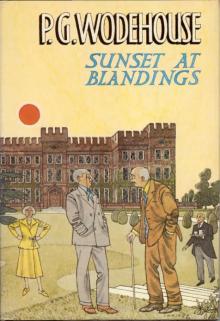 Sunset at Blandings
Sunset at Blandings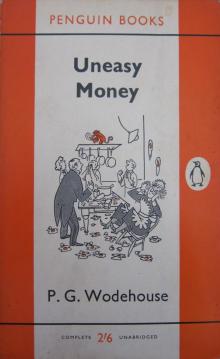 Uneasy Money
Uneasy Money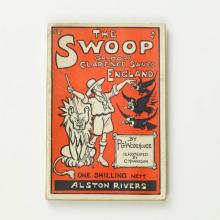 The Swoop! or, How Clarence Saved England: A Tale of the Great Invasion
The Swoop! or, How Clarence Saved England: A Tale of the Great Invasion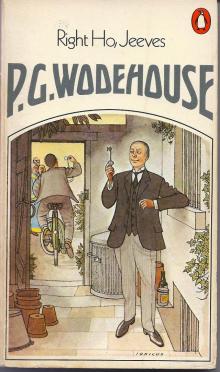 Right Ho, Jeeves
Right Ho, Jeeves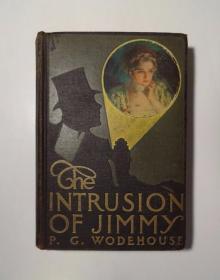 The Intrusion of Jimmy
The Intrusion of Jimmy The Jeeves Omnibus - Vol 1:
The Jeeves Omnibus - Vol 1: Aunts Aren't Gentlemen:
Aunts Aren't Gentlemen: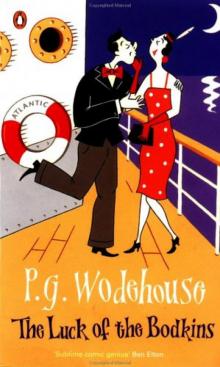 The Luck of the Bodkins
The Luck of the Bodkins The Little Nugget
The Little Nugget Money for Nothing
Money for Nothing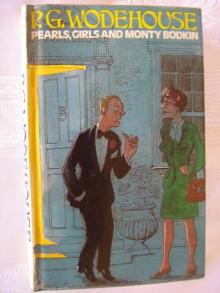 Pearls, Girls and Monty Bodkin
Pearls, Girls and Monty Bodkin Mulliner Nights
Mulliner Nights Blandings Castle and Elsewhere
Blandings Castle and Elsewhere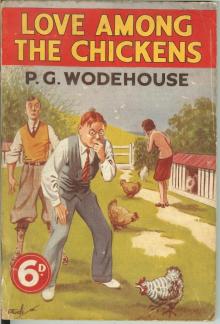 Love Among the Chickens
Love Among the Chickens Carry On, Jeeves!
Carry On, Jeeves!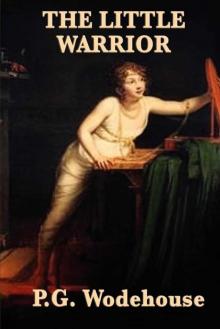 The Little Warrior
The Little Warrior Ice in the Bedroom
Ice in the Bedroom Leave It to Psmith
Leave It to Psmith Thank You, Jeeves:
Thank You, Jeeves: Money in the Bank
Money in the Bank The Man Upstairs and Other Stories
The Man Upstairs and Other Stories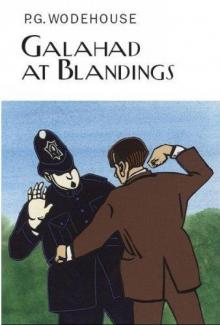 Galahad at Blandings
Galahad at Blandings The Jeeves Omnibus Vol. 5
The Jeeves Omnibus Vol. 5 Uncle Dynamite
Uncle Dynamite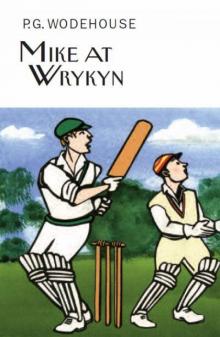 Mike at Wrykyn
Mike at Wrykyn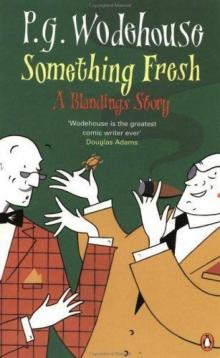 Something Fresh
Something Fresh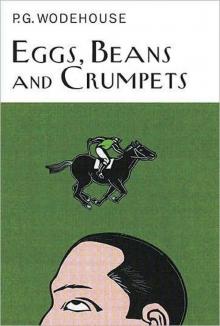 Eggs, Beans and Crumpets
Eggs, Beans and Crumpets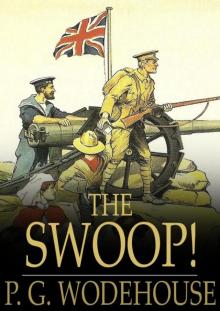 The Swoop: How Clarence Saved England (Forgotten Books)
The Swoop: How Clarence Saved England (Forgotten Books)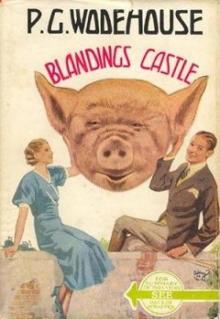 Blanding Castle Omnibus
Blanding Castle Omnibus Wodehouse at the Wicket: A Cricketing Anthology
Wodehouse at the Wicket: A Cricketing Anthology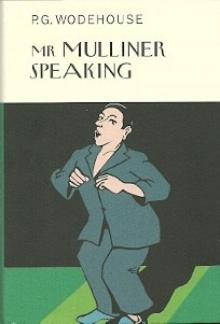 Mr. Mulliner Speaking
Mr. Mulliner Speaking Hot Water
Hot Water The Jeeves Omnibus - Vol 3: The Mating Season / Ring for Jeeves / Very Good, Jeeves
The Jeeves Omnibus - Vol 3: The Mating Season / Ring for Jeeves / Very Good, Jeeves The Mating Season
The Mating Season Meet Mr. Mulliner
Meet Mr. Mulliner The Man with Two Left Feet, and Other Stories
The Man with Two Left Feet, and Other Stories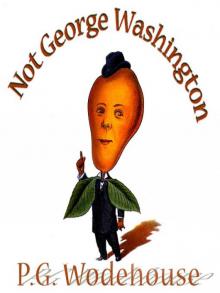 Not George Washington — an Autobiographical Novel
Not George Washington — an Autobiographical Novel Young Men in Spats
Young Men in Spats The Jeeves Omnibus Vol. 4
The Jeeves Omnibus Vol. 4 A Pelican at Blandings:
A Pelican at Blandings: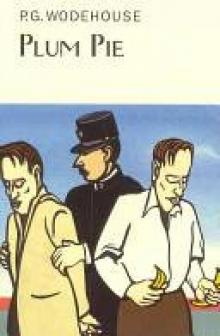 Plum Pie
Plum Pie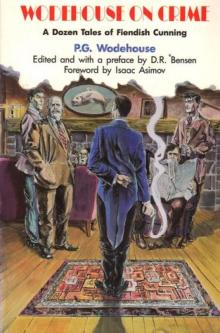 Wodehouse On Crime
Wodehouse On Crime The Jeeves Omnibus Vol. 2: Right Ho, Jeeves / Joy in the Morning / Carry On, Jeeves
The Jeeves Omnibus Vol. 2: Right Ho, Jeeves / Joy in the Morning / Carry On, Jeeves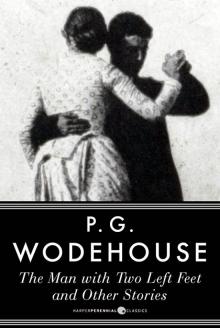 The Man With Two Left Feet
The Man With Two Left Feet Full Moon:
Full Moon: Jeeves and the Feudal Spirit:
Jeeves and the Feudal Spirit: Ring For Jeeves
Ring For Jeeves Something New
Something New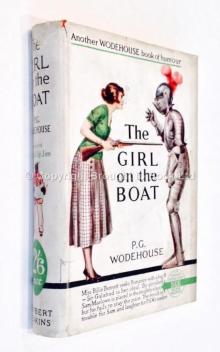 The Girl on the Boat
The Girl on the Boat The Girl in Blue
The Girl in Blue Pigs Have Wings:
Pigs Have Wings: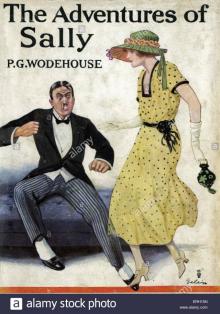 The Adventures of Sally
The Adventures of Sally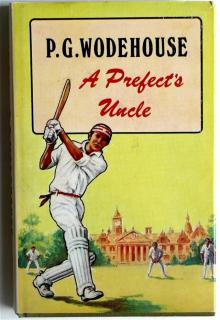 A Prefect's Uncle
A Prefect's Uncle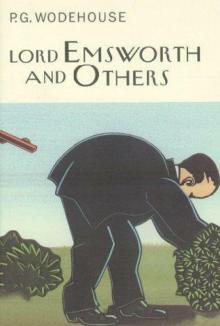 Lord Emsworth and Others
Lord Emsworth and Others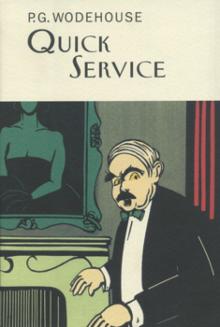 Quick Service
Quick Service The Prince and Betty
The Prince and Betty The Gem Collector
The Gem Collector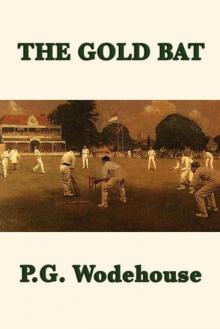 The Gold Bat
The Gold Bat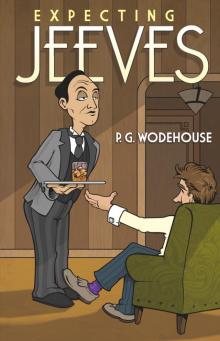 Expecting Jeeves
Expecting Jeeves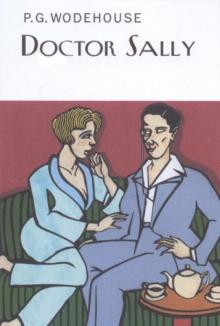 Doctor Sally
Doctor Sally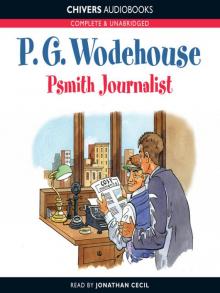 Psmith, Journalist
Psmith, Journalist The Golf Omnibus
The Golf Omnibus Heavy Weather
Heavy Weather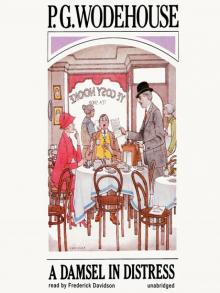 A Damsel in Distress
A Damsel in Distress The Coming of Bill
The Coming of Bill Summer Lightning
Summer Lightning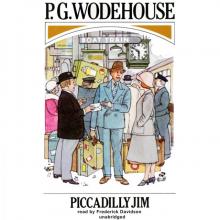 Piccadilly Jim
Piccadilly Jim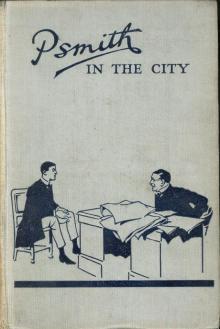 Psmith in the City
Psmith in the City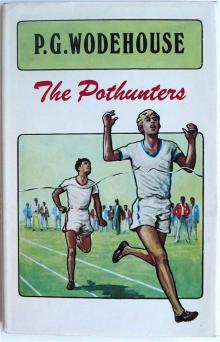 The Pothunters
The Pothunters Service With a Smile
Service With a Smile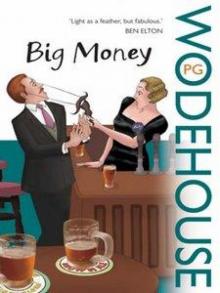 Big Money
Big Money Three Men and a Maid
Three Men and a Maid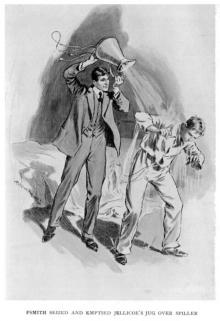 Mike and Psmith
Mike and Psmith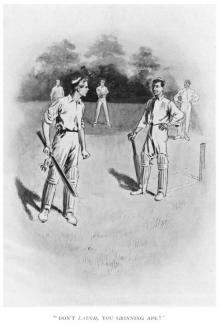 Mike
Mike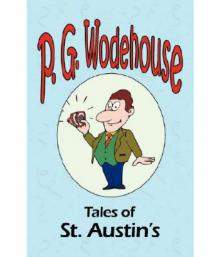 Tales of St. Austin's
Tales of St. Austin's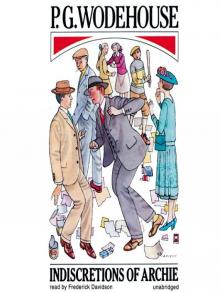 Indiscretions of Archie
Indiscretions of Archie Pigs Have Wings
Pigs Have Wings The Jeeves Omnibus - Vol 4: (Jeeves & Wooster): No.4
The Jeeves Omnibus - Vol 4: (Jeeves & Wooster): No.4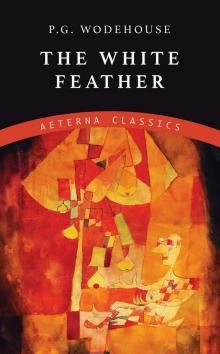 The White Feather
The White Feather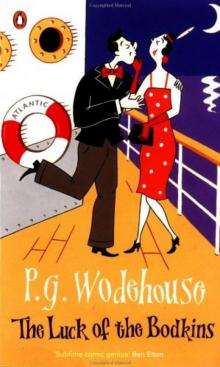 Luck of the Bodkins
Luck of the Bodkins THE SPRING SUIT
THE SPRING SUIT Full Moon
Full Moon Very Good, Jeeves
Very Good, Jeeves Thank You, Jeeves
Thank You, Jeeves Reginald's Record Knock.
Reginald's Record Knock. Wodehouse At the Wicket
Wodehouse At the Wicket LADIES AND GENTLEMEN V. PLAYERS
LADIES AND GENTLEMEN V. PLAYERS The Jeeves Omnibus - Vol 5: (Jeeves & Wooster)
The Jeeves Omnibus - Vol 5: (Jeeves & Wooster) The Jeeves Omnibus - Vol 1: (Jeeves & Wooster): No.1
The Jeeves Omnibus - Vol 1: (Jeeves & Wooster): No.1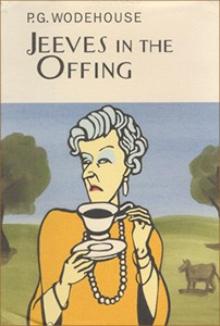 Jeeves in the offing jaw-12
Jeeves in the offing jaw-12